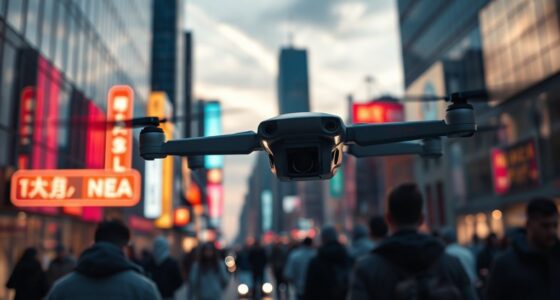The future of nanotechnology in warfare could drastically change how conflicts unfold, with tiny weapons and autonomous systems offering unprecedented precision and stealth. However, this also raises serious ethical questions, such as accountability and control, along with challenges in detecting and defending against these miniature threats. Nations may race to develop such tech, risking global instability. Exploring this further reveals crucial concerns about regulation and responsible use—look deeper to understand the full implications.
Key Takeaways
- Nanotech weapons will enable unprecedented precision in targeting and intelligence, transforming future battlefield strategies.
- Ethical concerns and accountability issues will challenge the development and deployment of autonomous nanodevices.
- Detection and defense against tiny nanoweapons will require innovative, advanced countermeasures, complicating existing security protocols.
- International regulation and cooperation are crucial to prevent proliferation, misuse, and destabilization caused by nanotech arms race.
- Balancing technological innovation with moral responsibility will shape policies to ensure nanotechnology enhances security ethically.

Nanotechnology is poised to revolutionize warfare by enabling the development of highly advanced, miniature weapons and defense systems. With this leap in technology, you could see tiny nanobots capable of infiltrating enemy defenses, delivering targeted destruction, or gathering intelligence with unprecedented precision. These small-scale innovations could make traditional weapons seem outdated, transforming how conflicts unfold. However, as you explore the potential of nanotech weaponization, it’s essential to consider the profound ethical implications. The ease of creating destructive devices at such a small scale raises questions about accountability, control, and the potential for misuse. Nanotech weaponization could lead to autonomous systems that make lethal decisions without human oversight, increasing the risk of unintended consequences or escalation. The very nature of these tiny weapons makes them difficult to detect and defend against, which complicates existing arms control measures. This raises concerns about arms races, where nations might rush to develop and deploy nanoweapons to maintain strategic advantage, potentially destabilizing global security. As you analyze the future landscape, you must grapple with whether the benefits of such advanced warfare capabilities outweigh the risks posed by their unethical deployment. The possibility of non-state actors acquiring nanotech weapons further complicates the scenario, threatening to turn these powerful tools into weapons of terror. The ethical implications extend beyond use in combat; they involve questions about the moral limits of creating autonomous, potentially lethal nanodevices. Should humans be the ones designing machines capable of deciding life or death? The risk of proliferation, accidental release, or malicious intent makes it clear that strict international norms and regulations are crucial but currently lacking. Additionally, the integration of headphones into modern communication systems could influence how information is gathered or transmitted in futuristic warfare contexts. As you consider the future, it’s vital to advocate for responsible development and deployment, emphasizing transparency and international cooperation. Without oversight, nanotech weaponization could spiral into a new arms race, where ethical boundaries are disregarded in pursuit of strategic dominance. The challenge lies in balancing innovation with caution—ensuring that these powerful tools enhance security without crossing moral lines. Ultimately, the future of nanotechnology in warfare hinges on your ability to recognize and address these ethical concerns, shaping policies that prevent misuse while harnessing the technology’s potential for defense. As nanotech continues to evolve, so must your vigilance in ensuring it serves humanity’s safety rather than its destruction.
Frequently Asked Questions
How Soon Will Nanotechnology Be Weaponized?
You might see nanotechnology weaponized within the next decade, as advancements make nano-enhanced armor and self-repairing drones more feasible. Researchers are actively developing these innovations, which could revolutionize defense strategies. You should stay informed about breakthroughs, since weaponization depends on overcoming technical challenges and regulatory hurdles. As this technology matures, it’s likely to become a significant part of modern warfare, transforming how conflicts are fought and defended.
What Are the Ethical Concerns of Nanotech in Warfare?
Imagine telling a medieval knight about nanotech, and you’ll see how ethics come into play. You face moral dilemmas like violating human rights, risking unintended harm, or creating autonomous weapons. These concerns challenge your responsibility to guarantee safety, accountability, and fairness. You must weigh the potential benefits against the risks, considering how to prevent misuse and protect civilians, all while steering through the complex moral landscape nanotech introduces to warfare.
Can Nano-Weapons Be Countered or Defended Against?
Yes, nano-weapons can be countered with advanced nano defenses and countermeasures. You can develop materials that neutralize or block nano-scale threats, such as coatings or filters that trap or deactivate nanomaterials. Additionally, implementing detection systems that identify nano-activity early allows you to respond quickly. Staying ahead involves continuous innovation in nano defenses, ensuring you can effectively defend against evolving nano-weapons in future conflicts.
How Will Nanotech Change Battlefield Tactics?
The ball is in your court, as nanotech revolutionizes battlefield tactics. You’ll see nano-enhanced reconnaissance providing real-time intel, making stealth operations more effective. Swarm nanobots can overwhelm enemy defenses, creating chaos within their ranks. This technology allows for precision strikes and adaptive strategies, forcing opponents to rethink traditional approaches. Ultimately, nanotech gives you a strategic edge, transforming how warfare unfolds and demanding new tactics to stay ahead.
What Are the Potential Civilian Impacts of Military Nanotech?
You should be aware that military nanotech could impact civilian safety if misused or released accidentally, potentially causing health issues or environmental risks. There’s also a concern about the environmental risks from nanomaterials polluting ecosystems. While these technologies aim to enhance defense, it’s vital to take into account strict regulations and safety measures to protect civilians and prevent harmful environmental effects from unintended nanotech exposure.
Conclusion
As you look ahead, remember that with great power comes great responsibility. Nanotechnology’s potential to revolutionize warfare offers both incredible advancements and serious risks. You hold the key to guiding its ethical use, ensuring it serves peace rather than destruction. Stay vigilant and proactive, because history shows that the pen—or in this case, innovation—can be mightier than the sword. Use your influence wisely, and never forget that the future is in your hands.









